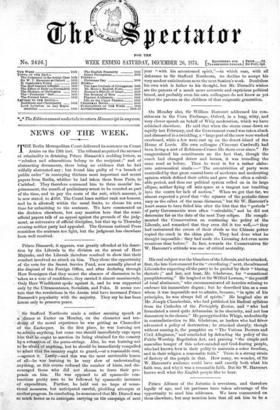Sir Stafford Northcote made a rather amusing speech at .a
:dinner at Exeter on Monday, on the character and ten- . -der\ey of the moral experience he was getting as Chancellor of the Exchequer. In the first place, he was learning not to-admire anything, lest some one should immediately urge upon him that he ought to sanction its being obtained for the country by a relaxation of the purse-strings. Also, he was learning not to be afraid of anything, lest he should be immediately compelled to admit that the country ought to guard,—at a reasonable cost, —against it. Lastly—and this was the most serviceable lesson .of all—he was learning to be very slow of understanding _anything, as this course reduced the number of hints, and dis- couraged those who did not choose to force their pro- posals on him. He was opposed to all spasmodic con- tractions pretty sure to be followed by spasmodic increases of expenditure. Further, he held out no hope of sensa- tional measures, but anticipated careful, plodding attempts at modest progress. In concluding, he announced that Mr. Disraeli was so much better as to anticipate carrying on the campaign of next
year " with his accustomed spirit,"—in which case, with all deference to Sir Stafford Northcote, we decline to accept his very modest vaticinations as to the next Session's work. Doubtless his own wish is father to his thought, but Mr. Disraeli's wishes are the parents of a much more eccentric and capricious political brood, and probably even his own colleagues do not know as yet either the parents or the children of that enigmatic generation.


































